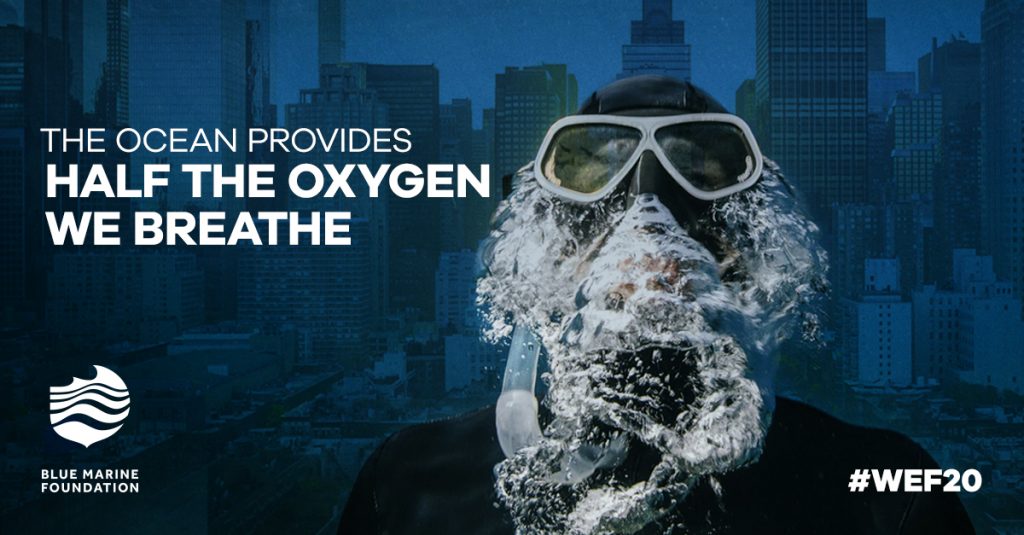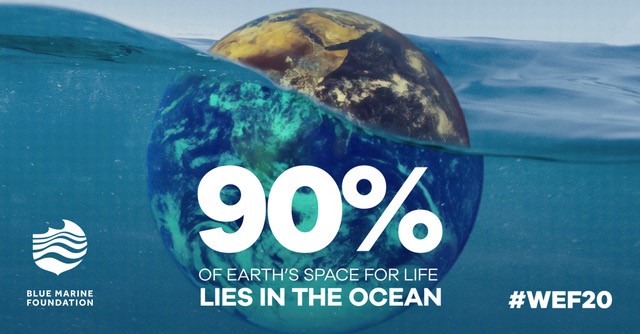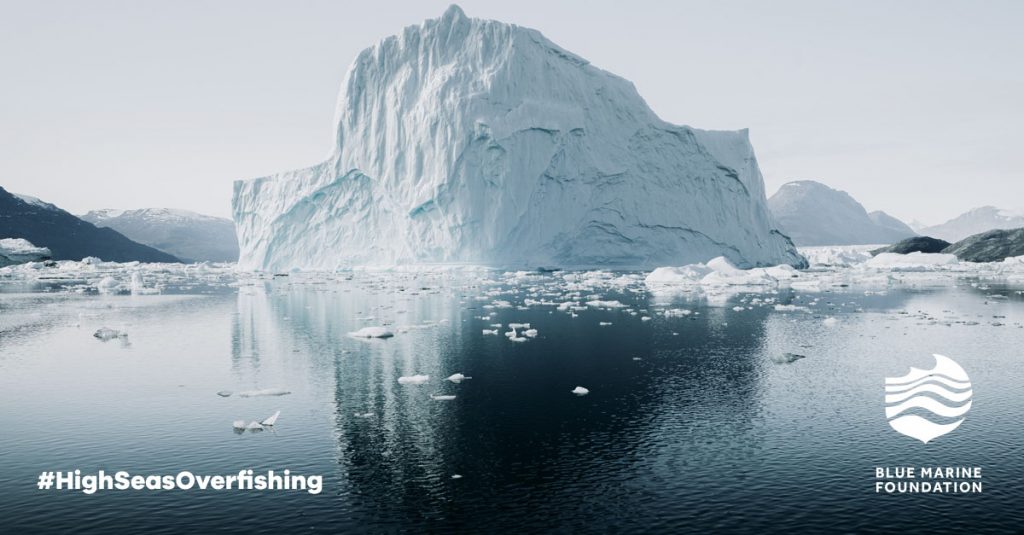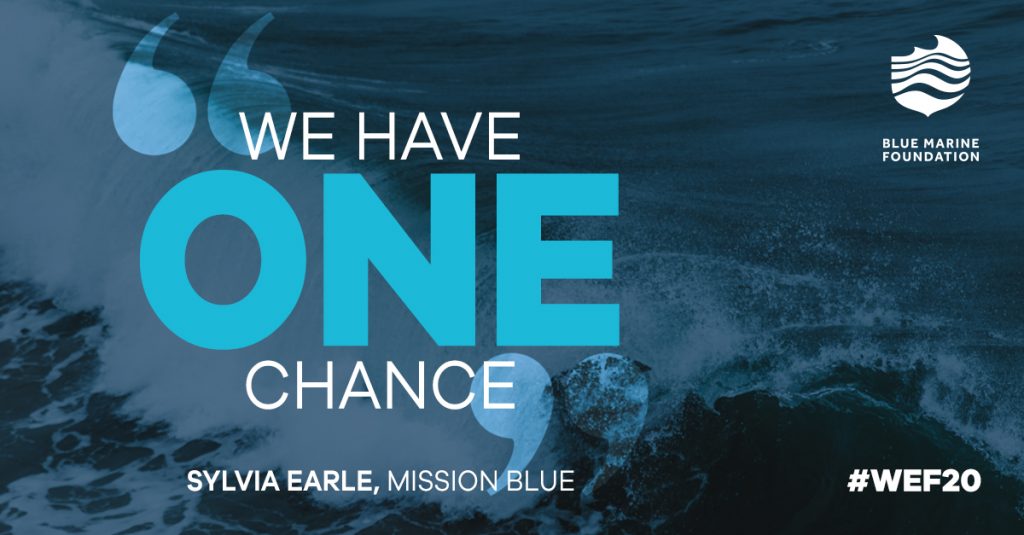Jo Coumbe reports on the ocean-based panel discussions of the World Economic Forum 2020 in Davos, kicking off the ‘ocean super year’
The World Economic Forum decided this year to dot panel discussions about the ocean through its four-day schedule in Davos – perhaps to include the ocean in all areas of debate, perhaps to avoid a single day-long session becoming an echo-chamber of ocean experts listening to ocean experts, perhaps to water down the impact.
Whatever your theory, thanks to mainstream media and hard-hitting campaigns from all fronts, the ocean has never been more prominent in the public eye. That in turn makes it an issue for industry, commerce and indeed governments, now shamed and coerced into putting climate change and the environment top of the bill. Here’s how the ocean featured at WEF.
The sea is absorbing our excesses – literally. The high seas capture 25 per cent of man-made carbon dioxide and as Enric Sala, the Nat Geo Explorer-in-Residence reminded us, “The ocean absorbs 90 per cent of the extra heat generated by human activities.” It is on the front-line of climate change, while doing its best to protect us from those significant and life-on-Earth-altering changes. Without a high-functioning ocean ecosystem the world is off balance. Kerstin Forsberg, founder of Planeta Oceano explained: “Our life depends on the ocean. When we breathe, we’re breathing oxygen that’s generated by the ocean. The weather we have is given to us by the ocean.”

The ever-remarkable Sylvia Earle, President and Chairman of Mission Blue, with dignity and delivery most politicians fail to achieve in a lifetime, laid it down: “What has taken more than four and a half billion years to create – an earth that works in our favour – in about four and a half decades we have managed to unravel the basic over-pinnings of what keeps us alive. What we now know that we could not know when I was a kid should cause us to treat the ocean for what it actually is. Our life support system. No ocean, no life, no blue, no green, no us. No life on earth. The ocean keeps us alive. Nature keeps us alive.”
Both high seas habitats and their wildlife play a crucial role in absorbing CO2 and releasing oxygen – a function that directly impacts the stability of the planet. Perhaps 90 per cent of the world’s fish by weight inhabit the high seas below the sunlit surface layer. Their daily migrations, feeding at the surface, pooping deep down, contribute to a phenomenon known as the biological pump, removing carbon dioxide from the atmosphere and transferring it to the deep sea where it may be locked away.
One has to question, even if the ocean was not at all linked to the climate change solution, should we sit back and allow it to be emptied, to be pillaged, to be devoured by powerful industries not just linked to the mass consumption of ‘luxury’ fish in developed countries, but to car manufacture and to mobile technology? Should we allow inshore fisheries – and the communities they feed – to be robbed of their sea ‘bank’, the high seas?

Sala explained, “Half of the fishing in the high seas would not be profitable without government subsidies and slave labour. If we protected all the high seas to fishing that would be the, economically and humanitarian, most optimal thing to do. The two main drivers of loss of marine life right now are destruction of biomass by fishing and global warming. Governments subsidise fishing with $35bn per year going mostly to destructive fishing practices. The money is there. We’re just using it for the wrong things.”
Spain, using a fleet subsidised to the tune of €24.6m, overfished yellowfin tuna by 19 per cent in 2017, and may have overfished again in 2018 by up to 30 per cent. Spain’s Minister for the Ecological Transition of Spain (and Deputy PM) Teresa Ribera sat on the ‘Swapping Subsidies for Green Incentives’ at WEF20, applauded for tackling fossil fuel subsidies. Perhaps the ocean is where Spain should next – and urgently – concentrate its efforts. Sala vividly described the overfishing crisis as “trying to make as much money as possible in the casino of the Titanic, after hitting the iceberg”.

Earle mused, “It’s only taken us about 50 years to take these amazing populations of tuna, of swordfish, of cod. When are we going to start thinking about fish as something other than commodities? We still think of what’s out in the ocean as ‘seafood’. How about thinking of life in the sea as ‘sea life’?”
Roberto Azevêdo, Director General of the WTO, was clear: “Failure is not an option. This has gone on for too long. Ninety per cent of the fish stocks out there are either fully exploited or over exploited. It’s not acceptable to continue like this. Subsidies had a reason. It was about food security, some had origins in the 17th century. What we’re seeing now is completely apart from the origins of all this. It has become something that is commercial. This is a commercial enterprise that is being subsidised by the state due to powerful economic structures.”
Forget the fact we have been treating the ocean as a bottomless and infinite resource, what of the deep sea? The International Seabed Authority has already issued 29 exploration contracts for mining in the deep seabed. These leases cover some 1.5 million square kilometres of the seabed, creating the largest potential mining operation the planet has ever seen, posing a serious threat to the deep-sea environment.
Earle warned, “The ocean is at risk as never before. With deep sea mining on the horizon – [it’s] a loss of diversity that we’ve yet to measure. We haven’t explored what’s there. We don’t know. We need to be careful as we take more of nature – to consume it – we need to realise the most important thing we’re consuming – that we’re taking from nature – is our existence.” She added that deep sea mining would “dramatically alter the nature of the deep sea in the high sea”.
Forsberg agreed, “In activities such as sea-bed mining, we don’t even have sufficient information on those areas on what could be the impact not only to the ocean but to ourselves. We should take a precautionary approach.”

So, what of the solution? Can oceans ever regenerate? Sala gave us fascinating insight: “What happens when we protect an ocean area? We see it come back to pristine in only ten years. On average the biomass of fish inside fully protected areas is six times greater than in fished areas nearby. And because the fish inside these parks are larger, they produce a larger number of eggs which helps to replenish the fishing areas around.” The fish bank.
He continued, “Another study showed that if we protected all of the high seas to fishing, the high seas would become a refuge for all the species that migrate between the high seas and countries’ waters, so there would be more fish for people to catch within their exclusive economic zones. At less cost.”
To protect all of the high seas – is it even viable? Earle noted, “At this critical moment in time if we really want to be taking bold steps to address the carbon cycle, carbon capture, planetary stability, why shouldn’t we be going all out to protect the high seas and the deep sea while there is time to do so, before vested interests get further invested”. She asked, “Could we, might we put a moratorium on industrial extraction of wildlife from the high seas?”
Sala explained, “Our research shows that by protecting the right places in the ocean – 30 per cent of the ocean by 2030 – this would protect key biodiversity, boost fisheries productivity globally, secure carbon stocks and many other benefits.”
Prince Albert II of Monaco sent a clear message to those in power: “We need as many fully protected Marine Protected Areas as possible. Be they in coastal areas, be they in remote areas, or be they on the high seas. There absolutely is no reason why policy makers, and why governments cannot put the right policies in place. It’s a question of putting these issues at the top of their agenda.”
We’ll leave it on a standout quote from Earle – one to linger in the minds of policy makers, industry leaders, academics, scientists, educators and indeed the public: “With the high seas now we have a chance. The high seas protection, the deep-sea mining issues, it’s right before us right now. These are the issues you have to take on. We have one chance.”
BLUE’s Chief Scientific Adviser and Trustee Prof Callum Roberts presents a sobering final thought: “The high seas are the engine of life that keeps the whole planet habitable. What we do in this space is incredibly important to the rest of life on earth. We could fundamentally break that whole system with devastating planetary consequences.”


















